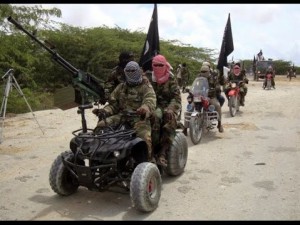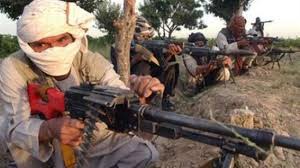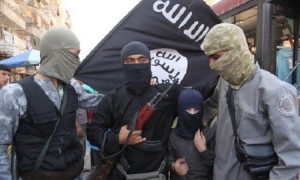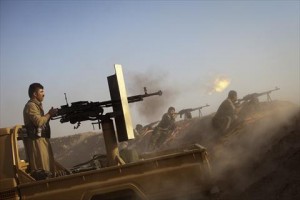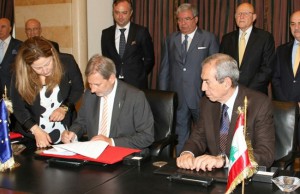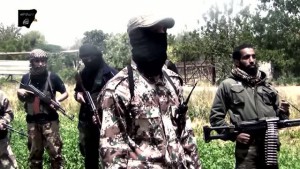There are more than 700 foreign terrorist fighters in Afghanistan now, says Afghan envoy
A new offensive against the Afghan government and people is being compounded by “an unprecedented convergence” of Taliban insurgents, more than 7,000 foreign fighters, and violent groups including the Islamic State, Afghanistan’s U.N. ambassador said.
Zahir Tanin told the U.N. Security Council that these groups not only target Afghan troops and civilians with suicide bombings, improvised explosive devices, hostage-taking and assassinations but they seek control of districts and provinces as bases for their activities in Afghanistan as well as south and central Asia.
Nicholas Haysom, the U.N. envoy for Afghanistan, said Afghan forces have been stretched, tested, and faced operational challenges since taking on full security responsibilities following an end to the U.S. and NATO combat mission.
Nonetheless, he said, “Afghanistan is meeting its security challenges” in the face of an intensifying conflict across the country,
The commitment of Afghan troops “is beyond question,” Haysom added, “and they are demonstrating resilience in the face of insurgent efforts to take and hold ground.”
Both Tanin and Haysom said the influx of foreign fighters into Afghanistan is a result of the Pakistani military’s campaign in neighboring North Waziristan which began last year.
“Our estimate is that there are more than 7,000 foreign terrorist fighters” in Afghanistan now, Tanin said, including Chechens, Uzbeks, Tajiks and Pakistanis.
The government also estimates “there may be hundreds or thousands of people” operating under the black flag of the Islamic State, including some “extreme-oriented Taliban,” he said.
Haysom said he told the Security Council “that increasingly Afghanistan, one of the 10 poorest countries in the world, is finding itself in the forefront of dealing with terrorists whose origins are the neighbors, and possibly whose eventual destination are its neighbors.”
He urged greater collaboration and support for Afghanistan “in dealing with what is a regional, shared threat.”
ISIS doesn’t yet see Central Asia as an area of interest for expansion
A report by the Polish Institute of International Affairs, Ready to Go? ISIS and Its Presumed Expansion into Central Asia, notes that the militant group Islamic State of Iraq and al-Sham (ISIS) does not currently see Central Asia as an area of interest for expansion
Although Central Asian states are vulnerable to the activities of radical Islamic organizations due to the weaknesses of their political and social systems—marked by authoritarianism, corruption, nepotism, and ethnic and religious tension, as well as their poor economic circumstances—interest in ISIS among their citizens remains low, the report says, noting that these states so far also have not become an area of interest for ISIS, although that may change.
According to the report, ISIS has devoted a far from overwhelming amount of attention to Central Asia and its potential for growth in the region. It largely ignored the September 2014 pledge of loyalty from the largest jihadist Central Asian group, the Islamic Movement of Uzbekistan (IMU), and so far has not tasked the Uzbek group with establishing an ISIS “province” in the region.
On Tajikistan, the report notes that Tajikistan is a state profoundly divided as far as ethnicity and geography are concerned, but more than 90% of the population are Sunni Muslims (the majority of them live in the western and north-western parts in places such as Ferghana Valley and Gissar Valley, which is where most of the country’s ISIS recruits come from). At the same time, the Gorno-Badakhshan Autonomous Region, located in the Pamir mountains and bordering Afghanistan, constitutes a special case as it is inhabited by a Shiite (Ismailis) population which feels threatened by Taliban incursions from Afghanistan. As a consequence, there is almost no interest in supporting Sunni and the revanchist ISIS in this region.
The report says the majority of Tajiks were recruited not in Tajikistan, but in Russia, where they work. The primary place of recruitment in Russia is in mosques, which consolidate working migrants and provides them with a sense of security and community. It is also worth adding that in stories about recruitment in the country, the narrative dominates that Chechens are responsible for it. Also social media is used for recruitment, again the sites Vkontakte and Odnoklasniki are used, but they are not the most popular way to obtain fighters. Russia-recruited ISIS-bound Tajiks mostly pass through Turkey, where visas are not required. Alternatively, they also pass through Afghanistan.
The report stresses that the vulnerability of Tajiks to recruitment is strongly connected with their exclusion both in Russia and their homeland (caused by the fact that since they are forced to work abroad they are no longer part of the society in their homeland, and simultaneously, they are not accepted as part of the society in the host country, either), the lack of good religious education and poverty. Paradoxically, the threat of a prohibition on entering Russia (400,000 Tajiks would feel the brunt of it) due to previous violations of visa regulations could also push people from the country to the Middle East as they would have no prospects to improve their material status. At the same time, another pull factor is the dream of a life in a “real Islamic state” where rules of Sharia apply. Other important factors are also the money that ISIS gives to fighters and their families, and the possibility of conducting jihad. This desire exists against the backdrop of rather unsophisticated knowledge on the tenets of Islam, and what jihad in a foreign land actually entails.
Tajikistan supports NATO on promotion of peace and stability in Afghanistan
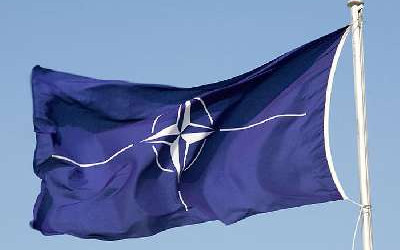
Tajik President Emomali Rahmon said that Dushanbe supports the initiative of NATO aimed at development of cooperation with the countries of the region on promotion of peace and stability in Afghanistan.
During the meeting of Rahmon with a delegation of the Parliamentary Assembly of the North Atlantic Treaty Organization (NATO), the sides discussed issues of cooperation on regional security.
The special attention was paid to the cooperation on promotion of peace and stability in Afghanistan and Tajik-Afghan borders.
It was noted during the meeting that Tajikistan and NATO’s cooperation is fruitful and covers various spheres including military training, language learning, the fight against international terrorism, extremism, elimination of weapons, border security, and the fight against drug trafficking, forecasting natural disasters and elimination of their consequences.
The cooperation is carried out within the program of Partnership for Peace and the individual plan of partnership and cooperation between Tajikistan and NATO.
Peshmerga forces kill 5 suicide ISIS elements in east of Mosul
An official of the Kurdistan Democratic Party announced, that five suicide elements have been killed in clashes with the Peshmerga in east of Mosul.
Saeed Mamouzini, an official of the Kurdistan Democratic Party (KDP) in Mosul, informed IraqiNews.com, “The Kurdish Peshmerga forces managed to repel an attack by ISIS elements against one of the sites of the Peshmerga in the area of al-Nouran in east of Mosul,” pointing out that, “The violent clashes between the two sides resulted in killing 5 suicide elements of ISIS.”
Europe signs off on $38M donations to Lebanon for training security forces
The EU signed a 15 million euro ($16,778,588) financing agreement for the training of Lebanon’s security forces, in a dedicated effort to bolster the country’s fragile stability.
The programs will be specifically designed to help security forces control the troubled eastern border, improve coordination and respond to the threat of chemical and biological weapons.
Johannes Hahn, commissioner for European Neighborhood Policy and Enlargement Negotiations, met with Prime Minister Tammam Salam Wednesday after signing the agreement. “The program is designed to leverage, wherever possible, greater coordination and interoperability between security sector agencies,” Hahn said in a statement.
In addition to the security grant, the EU donated 19 million euros ($21,254,754) for environmental projects targeting Lebanon’s heavily polluted coastline. Nabil al-Jisr, the head of the Council for Development and Reconstruction, signed the agreement for Lebanon.
The prime minister attended the ceremony along with Interior Minister Nouhad Machnouk, Environment Minister Mohammad Machnouk, ambassadors of EU member states and other Lebanese officials.
Hahn and Salam then discussed regional politics and relations in a meeting at the Grand Serail, according to the premier’s media office.
A core aim of the agreement is to help Lebanon’s security forces work in concert to secure the porous eastern border, which has seen ongoing spillover from Syria’s bloody civil war. Last August, militants overran the border town of Arsal, and still hold 25 servicemen hostage on its outskirts.
It is hoped that by improving coordination, the security forces will be better able to fight organized crime, facilitate cross-border trade, and manage the influx of refugees and migrants in the east. The Internal Security Forces will also receive training on interacting with vulnerable groups in a professional manner.
Hahn said improving interoperability was “of particular importance in the context of the Syria crisis, and it will build on and consolidate ongoing activities supporting the institutional and organizational advancement of the security services, as well as the development of the dialogue with civil society.”
Security forces will also receive additional training on emergency preparedness and response, with particular attention to chemical, biological, radiological and nuclear threats.
A second EU grant is aimed at rehabilitating Lebanon’s maritime ecosystem, and preparing the country for environmentally responsible oil and gas exploration.
“This action will directly contribute to preserving the biodiversity of coastal zones, while indirectly enhancing sustainable income generating activities,” Hahn said.
The grant will finance the treatment and safe disposal of 2,600 cubic meters of waste that remain from the massive oil spill caused by an Israeli airstrike on the Jiyyeh power plant during the 2006 July War.
The spill precipitated an environmental disaster, as thousands of tons of oil leaked into the Mediterranean from the plant’s damaged fuel tanks.
In addition to healing damaged marine ecosystems and reducing pollution in coastal areas, the funding is intended to limit environmental damage from further energy exploitation.
“It will … support the Lebanese government in applying the highest environmental standards in the context of the future exploration and production of offshore oil and gas resources,” Hahn added.
The two donations come following a memorandum signed by Lebanon and the EU in October 2014, in which the both sides pledged greater collaboration.
Houthi control creates competition between al Qaeda and Islamic State in Yemen
After Houthi fighters took control of the Yemeni capital of Sanaa on 21 September 2014, and soon other provinces, several armed groups including al-Qaeda in the Arabian Peninsula (AQAP) and the Islamic State (IS) declared they were against the Houthis.
In this way the Shia Houthi fighters became a target for AQAP and IS, both Sunni groups. Last week, when AQAP announced the death of their leader Nasser al-Wuhayshi, they declared that they were fighting the Houthis in 11 places, mentioning that they supported “popular resistance” in various governorates.
In the meantime, IS also claimed responsibility for targeting mosques in Sanaa on last Thursday and Saturday, when cars laden with explosives killed more than 30 people. IS said it targeted Houthi rebels at the mosques. Although the mosques are under Houthi control, Sunnis also pray at them.
The announcement by AQAP and the IS attacks are a clear indication that there is a competition between IS and AQAP in Yemen. The two groups are rallying for more supporters by targeting Houthis.
AQAP out of the war
Saeed Obaid al-Jomhi, an expert on al-Qaeda and various Islamist movements, told Middle East Eye that AQAP’s declaration of war against the Houthis was all talk.
“AQAP are trying to say that they are supporting the legitimacy and they are serving the nation by fighting Houthis, but in fact they do not fight Houthis; rather they are trying to get new supporters by such statement,” al-Jomhi told MEE.
Al-Jomhi said that AQAP was harmful to Yemen because it gives Houthis a reason to fight in several provinces under the excuse that they are fighting al-Qaeda.
He said Houthis would occupy new provinces in order to “evacuate them” of al-Qaeda and IS members.
“In fact AQAP does not fight Houthis as a group. If there are some members of AQAP fighting in different provinces, they are fighting to protect their own provinces from Houthis – they do not fight as members of AQAP. Thus we can say that AQAP is trying to give a fake statement to get new supporters,” al-Jomhi said.
However, Houthi activist Hussein Al-Boukhaiti told MEE that armed Houthis are fighting AQAP members in various provinces. He said the Houthis were protecting civilians from AQAP members.
“There are also militia that AQAP uses to fight Ansar Allah [Houthis], and Houthis fight these militia to keep the country safe,” al-Boukhaiti said.
The phenomenon of IS targeting mosques
Last week, IS targeted four mosques under the control of the Houthis – an act that is against the policy of AQAP, which says it does not attack people in mosques.
The first appearance of IS in Yemen was last March, when it claimed responsibility for targeting the Badr and al-Hashoosh mosques in Sanaa, killing more than 100 people and injuring hundreds more.
“There are some members of AQAP who support the policy of IS, and they are working individually or in small groups, but we cannot say that IS has an organised group in Yemen, as they do not have popular acclaim in Yemen,” al-Jomhi told MEE.
Last month a drone near the publican palace in AQAP-controlled al-Mukalla, the centre of Hadramout province, reportedly killed Mamoon Hatem, a leading figure in AQAP who is supporter of IS.
Al-Jomhi said that IS could not build an organised group in Yemen, but that all its supporters could do was stage car bomb attacks. He said most IS supporters in Yemen have contact with IS members living outside Yemen, but they do not have contact with the main leadership.
“AQAP do not fight IS, but it is against the strategy of IS that aim to kill its opponents anywhere – even in mosques. AQAP still has some red lines in its policy that prevent it from doing this,” al-Jomhi said.
AQAP has influence in the south of Yemen more than the north, while IS has started to gain support in the north, especially in Sanaa. But this does not mean that IS will have more influence in the north, as supporters of IS are working individually and can appear anywhere, according to al-Jomhi. However, AQAP has leadership in specific provinces.
Retired Brigadier Ahmed Obaid told MEE that the Yemeni government had led more than one military campaign against AQAP in the south; the last one was in April 2014 in the Shabwa and Abyan provinces.
“We cannot say that the military could evacuate these provinces from AQAP members, but it is enough that the military can determine a stronghold of AQAP members and can target them anytime. But it is difficult for the army to determine a stronghold of IS in Yemen, as they do not have strongholds and have started to work individually,” Obaid said.
He said the best solution for the Yemeni government to overcome the spread of IS in Yemen was to intensify security in Sanaa and the other provinces.
Civilians are the main victims
While both AQAP and IS are targeting Houthis, many of those killed by IS were not Houthis, especially those who were praying in mosques at the time of IS attacks.
Yahya Soroor, 57, is one of the people who was injured last Saturday in the Kobat al-Mahdi mosque, which was targeted by a car bomb explosion. Soroor is not a Houthi supporter, but rather says he goes to pray at any nearby mosque.
“What is the guilt of the civilians who were killed and injured by the attacks of IS in Sanaa?” he asked.
“All of them are Muslims, all of them civilians, always civilians are the main victim of the conflicts,” Saroor said.
“In an indirect way IS created new Houthi supporters, when people hear that IS target Houthis in their mosques, immediately they feel sympathy for the Houthis.”
Islamic State fighters re-enter Syrian town of Kobani
Islamic State fighters have re-entered the Syrian town of Kobani and are battling Kurdish militia, a group monitoring the war reported on Thursday.
The town at the Turkish border was captured by Kurdish forces from Isis in January after months of fighting.
The attack by Islamic State fighters on Kobani, also known as Ayn al-Arab, began overnight with a car bomb attack near the border crossing between the town and Turkey, the UK-based Syrian Observatory for Human Rights said.
Dozens of people have been killed or wounded in the bomb attack and fierce clashes, it said.
“IS detonated a suicide bomb in the area near the border crossing with Turkey, killing at least five people,” said the observatory director, Rami Abdel Rahman.
“Fierce clashes erupted afterwards in the centre of the town and there are bodies lying in the streets,” he added, without giving a specific toll.
He said fighting was still raging on Thursday morning.
A Kurdish YPG militia official told Reuters that a car bomb had exploded in Kobani, near the Turkish border gate, on Thursday as Isis militants staged an attack from three sides of the town.
Isis battled for four months to seize Kobani, but Kurdish fighters – backed by US-led air strikes – secured control of the border town in January in a symbolic defeat for the jihadists.
Thousands of people who fled Kobani across the border to Turkey have returned to the town since the siege.
Welat Omer, a doctor in Kobani, told Reuters that around 60 to 70 people had been wounded in the latest attacks, many of them women and children.
In recent weeks, forces of the Kurdish People’s Protection Units (YPG) have advanced from Kobani in Aleppo province into neighbouring Raqqa province, the Isis stronghold.
They captured the strategic town of Tal Abyad, also on the border with Turkey, and pushed towards Isis’ de facto Syrian capital of Raqqa city.
Isis fighters were also reported to have wrested areas of the northeastern Syrian city of Hasaka from government control in fighting overnight, although a Syrian military source denied the report, saying the army had repelled the attack.
Algeria: 63 of Its Citizens With Islamic State
Algeria’s minister of religious affairs says only 63 of the country’s citizens have joined the extremist Islamic State group, in stark contrast to its neighbors.
In remarks carried in the media Wednesday, Mohammed Aissa said the figures came from Interpol and noted that less than 1 percent of IS members were Algerian.
Neighboring Tunisia and Morocco are among the biggest source of recruits for the group, with an estimated 3,000 and 1,500 coming from each country, respectively.
Experts have attributed the low numbers to vigilant internal security, homegrown extremist groups and a general fatigue with fighting following the civil war in the 1990s.
In the past several months, Algerian forces also announced several victories against a local group allied to IS which killed a French hiker.
Kurdish militia wants Syrian rebels to lead attack on Islamic State HQ
A Kurdish militia leading an attack on Islamic State strongholds in Syria so far has no plan to extend the assault to the group’s de facto capital of Raqqa city, and such an advance should be led by Syrian rebels, a Kurdish leader said on Wednesday.
The comments by Saleh Moslem, leader of the Democratic Union Party (PYD), indicated there is no imminent offensive on Raqqa city by the Kurdish-led forces that have made swift gains against the jihadists backed by U.S.-led air strikes.
Backed by smaller Syrian rebel groups, the Kurdish YPG militia moved to within 50 km (30 miles) of Raqqa city on Tuesday with the capture of the town of Ain Issa in northern Syria, backed by U.S.-led air strikes.
Driven from areas north of Raqqa, Islamic State was reported to be reinforcing its positions near the city on Wednesday, digging trenches and bringing in truck loads of weapons.
But Moslem, whose party holds sway in Syria’s Kurdish areas, said it was up to rebel groups fighting with the YPG to decide on any advance on Raqqa itself.
“We spoke to the YPG leadership. They don’t have a plan towards Raqqa so far. This (decision) is linked to the revolutionary forces in Raqqa,” Moslem said in a telephone interview.
“When they are ready to free Raqqa, to liberate it, perhaps the YPG will decide to support them. But the YPG have not made a decision in this regard so far,” he said.
The YPG has emerged as the only notable partner on the ground to date for the U.S.-led alliance bombing Islamic State in Syria, and has fought several successful campaigns against the jihadists with air support.
Moslem’s comments indicate the well-organised YPG’s reluctance to venture far beyond Kurdish areas to attack Islamic State in parts of Syria where Arabs are in the majority: the YPG’s stated aim is to defend the Kurdish areas.
SYRIAN KURDS SAY DO NOT WANT SEPARATE COUNTRY
The Obama administration has touted Kurdish-led advances as a model for the U.S.-backed effort to roll back the jihadist group. A U.S. plan to train and equip the “moderate” opposition to fight the jihadists is stumbling.
The capture of Tel Abyad at the Turkish border last week severed an important Islamic State supply route.
The Syrian Observatory for Human Rights, which monitors the war, said Islamic State had called in reinforcements of 100 truckload of weapons and ammunition which it was believed to be deploying at a military base on the Raqqa outskirts.
YPG spokesman Redur Xelil told Reuters the Kurds had received information that Islamic State had “begun digging trenches in the vicinity of Raqqa to improve their defences”.
Some Syrian opposition activists have accused the YPG of driving Arabs and Turkmen from areas taken over in the latest advance – an accusation of ethnic cleansing echoed by the Turkish government but vehemently denied by the YPG.
The Observatory says it has not recorded any systematic abuse of human rights by the advancing YPG forces, though there have been some individual cases.
The capture of Tel Abyad linked up two of the autonomous Kurdish zones in northern Syria, fuelling Turkish concerns about Kurdish separatism in Syria that could encourage its own Kurdish minority.
The Syrian Kurds say they do not want a separate state, but that their model of regional autonomy should be the basis for an eventual solution to the Syria war.
More than 23,000 people fled into Turkey from Syria as the Kurdish-led advance approach Tel Abyad, and thousands more have reportedly fled to Raqqa city from the advancing YPG-led forces.
Moslem said claims of ethnic cleansing aimed at igniting Arab-Kurdish strife and would not succeed, adding that returning the displaced to their homes was a priority for the YPG.
